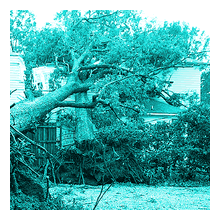Home Insurance Claim And Hurricane Damage Myths
Posted by Joe Brennan | Posted in Homeowners Insurance, Insurance Advice, Insurance Claims Help, Insurance Dispute | Posted on 06-07-2010
22

1. Always open windows on the least exposed side of the house to relieve air pressure
It is down right impossible to know ahead of time which direction could be the leeward wall – as strong winds can and often do change as a storm moves through. Attempting to open and close the windows at the time of a hurricane puts you near window glass that can break, increasing injury. In addition, as the hurricane direction changes, the open windows can welcome wind-driven rains to flow within your home or structure and damage contents. Common leaks of air around your windows and doors will tend to relieve wind related pressure in a dwelling and lower the atmospheric pressure from the event outside. The greatest danger comes when the very large window or door fails on a wall facing the wind. The key is keeping all wind and rain out of the home with proper ventilation.
2. Property Owners should protect the windows and doors facing the ocean or gulf sides
Being that hurricanes are a blustery, spinning type storm, wind loads will impact from any direction, which can often change quickly, all of a sudden you find yourself in the eye of the storm. Your best bet is to protect windows and doors on all sides of your structure.
3. Tape big “X” on windows
Taping glass doesn’t do anything to secure or protect windows. Although duct tape does wonders for many around the house tasks, it cannot help to keep the window glass in their frame and firmly fixed to the structure.
4. Leaning or pushing up against the window or doors that is being blown inward by the wind pressure will help in securing the window or door from becoming damaged
This clearly puts you in harm’s way and increases the likelihood that you can become cut or incur bodily harm. Makes no difference what kind of glass the home has, you should stay and keep away from any glass during severe windstorm. Before a hurricane begins, be sure to inspect the anchoring of your doors. With all entry doors, you can install more latches and make sure that hinge points are well-secured with at least 3″ screws that are secured into the wall framing. Take protective action before hand to ensure you won’t be tempted to try and keep doors secure by leaning on them. Shield yourself with as many walls as you can between you and the windward elevation.
5. I’ve had insurance with this company for 40 years. They will pay for all damages to my property
Unfortunately insurance agents sell policies and truly give a false sense of security to policyholders. Most people believe that when they have damage to their home they will be covered in the even of a disaster or when they suffer a loss. Well… not exactly. There are issues with larger storms that can result in damages that are simply not covered under certain policies. For instance, damages caused by flooding are not covered under homeowners or business insurance. In the event you suffer damages from a flood, you must have a flood policy on top of your homeowners or business policy.
Hurricanes can also produce storm surge. Storm surge is an offshore rise of water associated with a low pressure weather system, like a hurricane or cyclone. Storm surge is caused primarily by high winds pushing on the ocean’s surface. The wind causes the water to pile up higher than the ordinary sea level. When the surge pounds the coast it causes severe damage to homes and buildings. This type of damage is not covered under ANY insurance policy.
6. “You can’t fight city hall!” Or in this case Insurance Companies (BONUS Insurance Tip)

Well, you may not be able to fight city hall… but, you can fight for your rights in an insurance claim. If you do decide to dispute your claim with your insurance company you are actually protected by your policy. Almost all insurance policies for property damage have a little known clause called Appraisal. Appraisal allows disputes to be solved by independent appraisers and an umpire as opposed to fighting it out in court.
The appraisal process allows for home insuracnce claim disagreements and disputes to be resolved using a less costly and less time consuming process. Although the appraisal process and award (outcome) is binding, it is a less formal process that does not involve attorneys, judges, juries, or courtrooms. Find out the full details at Insurance Appraisal Process .com
| [ Cast A Vote for Useful Information Page ] |
|
(C) Joe Brennan is President and owner/operator of Insurance Claims Group, Inc., a national independent adjusting, appraisal, and umpiring firm. We will answer your claim questions FREE as part of our FREE Insurance Advice and Insurance Claim Consulting Services.
Insurance Claims Group, Inc.
Joe Brennan
Ph: 919-669-9111
Fx: 919-573-9595
info@insuranceclaimsgroup.com
Insurance Claim Help and questions about Independent Appraiser Services is available by visiting Insurance Claims Group | Insurance Appraisal Services | Insurance Appraisal Process | Insurance Appraisal Umpire | Fire Insurance Claims
